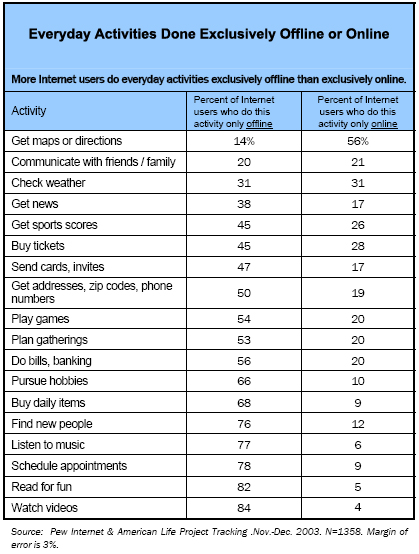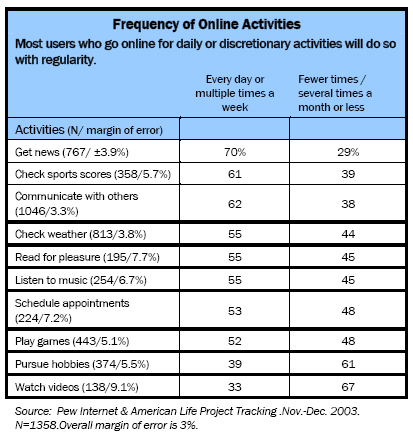Most Internet users are more likely to do everyday activities in the traditional offline ways than online.
Two different measures indicate that Internet users who do any given activity in their everyday lives are more likely to do that activity offline than online. First, we find that among Internet users who sometimes do a given activity offline and sometimes do it online, many more were likely to choose the offline option more frequently. And second, among Internet users who do a given activity, many more are likely to do that activity exclusively offline than exclusively online.
First, it made sense to us that many Internet users who perform a given activity would find themselves toggling back and forth between online and offline modes. As people move about in their everyday lives, sometimes using a computer is more convenient or appropriate for them, and sometimes it is not.
Two Internet users describe this online/offline toggling and the advantages of each: “I still rely on the old tried and true ways when I get up (in the morning), CNN, my local channels, the newspaper…Habit, I guess, but if I want to find some future news or something special, the Internet is the way.” And the second writes, “I do 90% of my banking and bill paying online. I visit the bank for manual deposits and ATM transactions 6 – 8 times a year.”
We asked these bi-modal users – those who toggle between online and offline – which mode they used more often, offline or online. In every case but one, many more bi-modal users said they more frequently did these activities offline than online. Among the most marked are in areas of entertainment, communicating with friends and family, shopping for daily goods, getting ubiquitous information like news and weather. Some of those activities where the Internet showed the strongest pull are the killer everyday app of getting maps or directions (48% do that more often online) and getting addresses, phone numbers or zip codes, doing banking, buying tickets, playing games, and getting sports scores.
Even though our tracking surveys indicate that over time, more and more Internet users are going online to try different everyday activities, large numbers of them remain in the camp of those who never have gone online for some popular activities. When we asked users if they did a particular activity exclusively online or exclusively offline, we saw the same pattern of results that we saw in preferences among those who toggle back and forth between the online and offline worlds. Particularly in the category of entertainment, users stick to the offline world. Nearly two-thirds and upwards continue to pursue these entertainment activities exclusively offline. Users show the most commitment to being online for the same kinds of interactive or purposeful activities that led the “togglers” to prefer online mode: 56% of those who get maps or directions will do it online exclusively. Between a quarter and a third check weather, buy tickets, or get sports scores exclusively online.

Once people start using the Internet for their everyday activities, however, they show signs of making it a habit.
Another measure of how well users blend the Internet into daily rhythms is regularity of use: Is the Internet becoming a habit? We explored whether users who go online for everyday activities log on casually and intermittently, or with more committed, dedicated regularity.
We divided the activities into three groups: daily ones, like checking the weather, or getting the news; regular but more infrequent ones, like paying bills or getting maps; and ones that are discretionary and without a time frame, like listening to music or watching video clips. We asked people how often they go online for various activities, and we found that the majority of users went online with what seemed like appropriate frequency.

Of those who do perform what we consider “daily” activities online, well more than half say they go online every day or several times a week to perform those activities. We also found that for many of the most discretionary and recreational activities, more users went online everyday or several times a week. For some activities, like doing banking or getting maps, we deemed frequency a less reliable measure because of their irregular, unpredictable demands.
The daily activity that users engage in most often was getting news. Some 40% of Internet users who get the news online say they log on daily, and a total of 70% do that at least several times a week. Some 25% of the online weather bugs will check weather daily, and 55% in all will check weather at least several times a week. Some 20% of online sports fans check sports scores daily, and 61% at least several times a week.
Among discretionary recreational activities, 55% of the online music lovers listen to music or read online for pleasure at least several times a week; 52% of the online gamers will play games at least several times a week.
These data strongly indicate that for people who do use the Internet for their everyday activities, albeit a minority of users, they are going online in a way that suggests they are incorporating internet use into their lives in a more regular, predictable, habitual way.
The Internet’s strong suits are the efficiencies it offers and the abundant content it warehouses.
Common elements emerge from this survey that shed light on where the Internet works well for users and where it doesn’t.
Efficiency: fast, convenient, and on-demand
The Internet is well known for its efficiency. Each one of the most popular everyday activities we polled is characterized by the efficiency of doing that activity online.
One Internet mom says, “It is easier for me with two kids to find more information on the Internet than to drive to the library for just a small amount of info.”
The Internet can eliminate waits standing in line or hanging on hold to buy tickets, do banking, or make appointments. The Internet lets people choose their moment for these tasks: Users can shop at midnight instead of waiting for stores to open or call up weather, scores, and news stories instead of waiting for media broadcasts to deliver them. And they can do all these things from the comfort of home.
“I have access to gourmet shops, yarn shops, quilt shops, huge bookstores – all things I might otherwise have to drive to Dallas to buy,” wrote one user to our online query.
The Internet can pare impedimenta like stamps, envelopes and paper checks from tasks that involve processing and communicating. The Internet can lop off much of the back and forth of face-to-face interactions and exchanges of day to day life. It streamlines the multiple steps toward reaching agreement among numbers of people, as in organizing groups, or numbers of alternatives, as in agreeing on a common time or even place to meet.
Content: abundant, organized, searchable
The Internet holds an ever-growing repository of content, a source for much of the reference material of daily life: maps, phone books, newspapers, dictionaries, address books, catalogs, records in far greater quantity that exceeds what anyone has in his own possession. The content resides at users’ fingertips, organized, easily accessed, with all the information specifically searchable and retrievable, not lost amid cluttered shelves or under car seats.
One Internet user describes this: “The net is where I go first for all types of information, weather, news, health info, phone numbers, restaurant menus, store hours, maps… at this point, I am surprised if what I need is not on the net!”
Another adds, “I also use it as a research tool, both for work and outside of work. At work, I use it to check spelling, definitions of things. Right now, I am using some information on map projections I got off of a geographer’s Web site. I also use the internet to look up journal articles, to find additional information to enhance my teaching, to provide inspiration for different types of laboratory activities in my classes. I also us it for “research” outside of work – I’ve looked up knitting techniques and quilting patterns on the Internet and I’ve also looked for information on historical events or customs mentioned in books I’m reading that I am not familiar with.”
The Internet’s weak points are its required user skills and the incomplete experience it offers.
On the other hand, there are cases where far fewer people turn to the web. Looking at the everyday activities that are less popular and less engaging, we find some common elements suggesting points where the Internet works less well. Among these activities are pursuing hobbies, reading for pleasure, watching videos, purchasing everyday goods, and listening to music.
More skill required; less quality returned
The survey shows that overall, people are less enthusiastic about the Internet as a place to go for entertainment and recreation than they are for other kinds of activities. For many of these activities – listening to music, watching video clips – more familiarity and technical adeptness are required than in most other daily Internet activities. And the quality of the product, particularly compared to the offline alternatives, doesn’t match up to offline alternatives at times.
Incomplete experience
The Internet offers a less than whole experience for many day-to-day activities. You can email your friends and family, but sometimes there’s nothing like hearing a voice.
Writes one grandmother, “My daughter in Germany and I talked every day and didn’t have to pay a huge phone bill. I have a webcam and a microphone that I used to help watch my granddaughter grow up, not missing a word or an inch of her growth. When they finally came home it was like they hadn’t been away for four years, with the exception of not getting to love them physically. But she knows what Grandma’s arms feel like now.”
Or, you can read articles and even books on the web, but you can’t reproduce the sensory experience of curling up in a chair, holding a book. As one Internet user writes, “I no longer subscribe to the M-F newspaper. I get my news online from several news sources including online newspapers. I still like having a physical paper in hand on the weekends though.”




